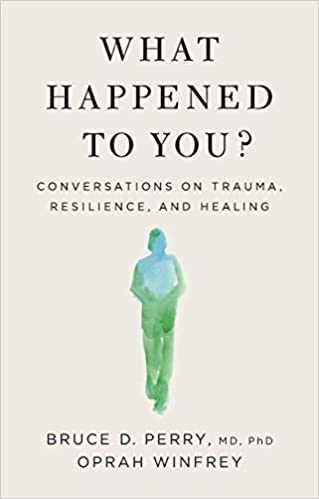What Happened to You? — Book Summary
Introduction
Oprah Winfrey is someone many people respect and recognize all over the world. She is in short, an icon. Oprah Winfrey understands how experiencing trauma at a very young age can be. Her goal is to help every reader to understand how their difficult pasts could impact their lives and personalities. Dr. Perry's contributes with a clinical perspective to further aid this goal.
Interesting quotes from the book
Through this lens we can build a renewed sense of personal self-worth and ultimately recalibrate our responses to circumstances, situations, and relationships. It is, in other words, the key to reshaping our very lives.
— Oprah Winfrey, What Happened to You?
Not only is 'What Happened to You' the key question if you want to understand someone, it is the key question if you want to understand the brain.
— Oprah Winfrey, What Happened to You?
Summary of the book What Happened to You?
The book takes the form of deeply personal dialogue (as opposed to narratives or exposition) between Dr. Perry and Oprah that discusses the impact of trauma and adverse experiences on a person, and essentially, how we must tackle this by asking "What happened to you?" instead of "what's wrong with you?"
The book begins with Oprah telling the story of something that happened when she was only three years old. One morning, as they prepared to head out and begin going to church, Oprah's grandmother noticed her dipping her finger into the bucket of freshly-pumped drinking water. Usually, adults will smile benevolently at the mischief and cute unruliness of children, but Oprah's grandmother was furious. She bent over little Oprah and whipped her so much that blood seeped through her clothes. This made the grandmother even angrier as she blamed her granddaughter for ruining her best Sunday dress.
This, and the myriad of corporal punishment, which wasn't something new for Oprah, affected her for the rest of her life. In childhood, she got severely beaten up every time she broke a glass or spilled water. She even had to prepare her own switches. Only when she couldn't stand at her feet because of pain and exhaustion, her grandmother would release her and order her to put a smile on her face. The desire to please her grandmother and everyone around her became such an all-consuming and obsessive desire that it defined Oprah's relationship and actions for the next 40 years of her life.
People who went through painful experiences, especially those caused by a family, tend to blame themselves for everything bad that happened throughout their childhood and even all the problems they encounter in adulthood. Usually, they keep asking themselves the questions "Why did I do this?", "What is wrong with me? "They think they are somehow at fault for the abuse they suffered. But really, the truth is that emotional trauma and abuse force us to be extremely hard and critical of ourselves. Instead of trying to self-flagellate and begin to extremely criticize yourself for what happened, these authors suggest looking back and analyzing what happened to you. In essence, we should try to understand our pasta instead of trying to blame ourselves for whatever happened then.
Oprah Winfrey shares the lessons she learned from her brutal childhood experiences - that the things we experience when we are children, especially if they leave deep, indelible scars emotionally, greatly affect our personality and how we act.
In a nutshell, a victim should not be blamed or accused wrongly for his actions and for the emotional baggage they carry. They should instead be helped to abandon this baggage in the past and start the future on a clean slate. The book even teaches us that sometimes, these horrible experiences may even work out for the better. The forced smile she had to put on her face to make her grandmother happy made Oprah a serial people pleaser, which may have affected her, but also helped her build many strong relationships with others. Her desire to make people satisfied led to a lot of nice friendships in her life. A lot of times though, there are usually bad effects. For Oprah, it made her develop the habit of solitary abandon and independence.
Trauma develops our behavior, our physical, mental and emotional actions are shaped by this trauma, which may come in any variety of shapes, manifestations, and magnitudes. Trauma develops our behavioral patterns and Dr. Perry, along with Oprah Winfrey, tries to teach new approaches to deal with the trauma and its effects, which are mostly bad. They discuss many methods of self-comprehension and self-forgiveness, which are a well-proven way to recover, and which many people should carry out too.
Dr. Perry then talks about how the brain reacts to stress and abuse, supporting Oprah's story about adaptivity and how it is a survival mechanism for our traumatic experiences. Although trauma may greatly influence our behavior and our personalities, adaptivity helps us break out. The key is to understand why we do what we do and try to develop different reactions to circumstances.
In essence, "What Happened to You? Conversations on Trauma, Resilience, and Healing" lets us shine a lens on our past, and look to the future in a new light. It tries to change the approach and perspectives of mending relationships and making peace with everything that has happened. It is a great help for those still dealing with the spectres of traumas in the past, with its personal stories and scientific insights providing a radical way for us to view our own lives.
Key Lessons from the Book
Lesson 1: What we experience in childhood shapes us forever.
Childhood is an important period in our lives, and what we face in this period is very important, as our personalities and habits begin to take shape in this period. This is why childhood trauma hits us so hard through our lives, especially when unchecked.
Lesson 2: Give yourself more grace.
It's easier to echo what negative things certain people have said about us, but we have to deliberately ensure that we give ourselves room for growth, being compassionate to ourselves as well, speaking positive words and affirming ourselves.
Lesson 3: Trauma changes us.
We don't bounce back from trauma the same. Trauma changes bit of us we may not even realize for many years to come. We have to put in the work to ensure we reduce/eradicate maladaptive behaviors that are formed and live our best lives notwithstanding.
Review of the book What Happened to You?
This book was emotional and raw for me to read. I appreciated being able to take such a look into Oprah's life. However, looking at several issues that affect myself and many other people hit quite close to home at times. I like the book and I don't think I would be re-reading just once. I liked how the authors encourage for us to reframe the question "what's wrong with you?" to "what happened to you?"
Conclusion
I would recommend this to anyone with a traumatic experience especially in the formative years of their lives. The book is deep and rich with knowledge, exploring trauma in ways that would be harder to do alone.
Don't miss the other book summaries on SunInMe.org

